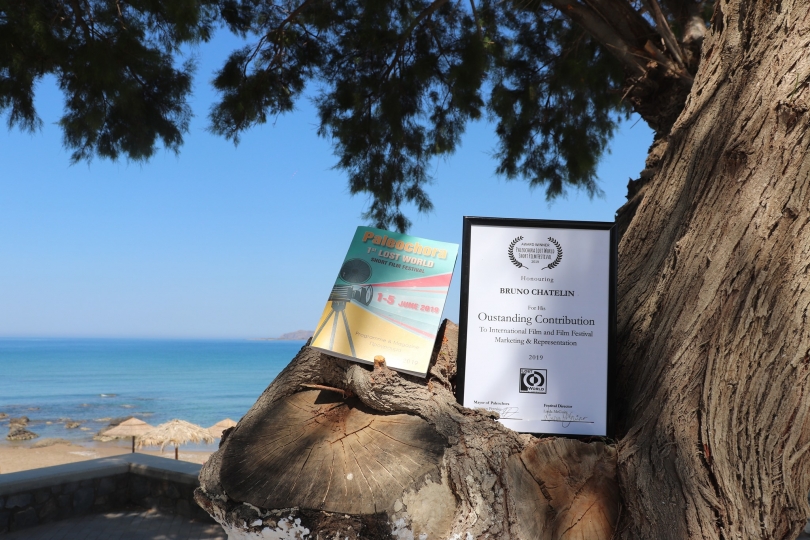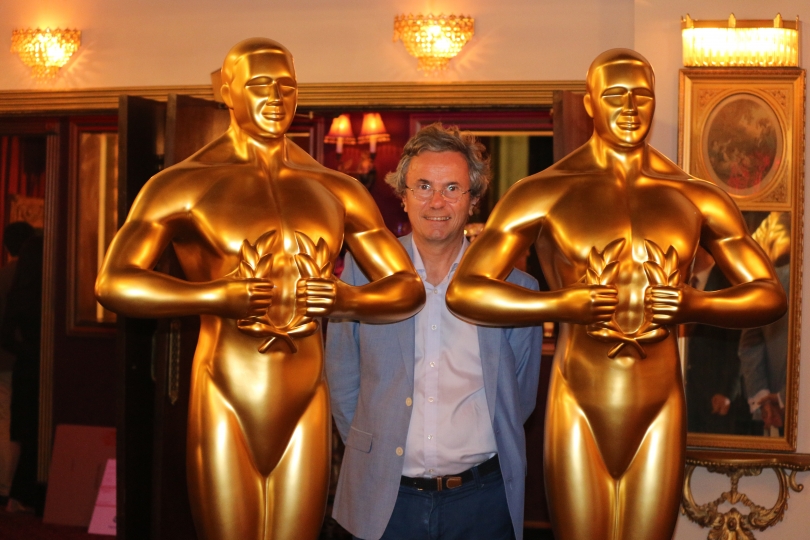|
|
||
|
Pro Tools
FILMFESTIVALS | 24/7 world wide coverageWelcome ! Enjoy the best of both worlds: Film & Festival News, exploring the best of the film festivals community. Launched in 1995, relentlessly connecting films to festivals, documenting and promoting festivals worldwide. Sorry for the disruptions we are working on the platform as of today. For collaboration, editorial contributions, or publicity, please send us an email here. User loginActive Members |
Editor
THE NEWSLETTER REACHES 171 000 FILM PROFESSIONALS EACH WEEK (december 2023) .Share your news with us at press@filmfestivals.com to be featured. SUBSCRIBE to the e-newsletter.
MEET YOUR EDITOR Bruno Chatelin - Check some of his interviews. Board Member of many filmfestivals and regular partner of a few key film events such as Cannes Market, AFM, Venice Production Bridge, Tallinn Industry and Festival...Check our recent partners. The news in French I English This content and related intellectual property cannot be reproduced without prior consent.  Spotlight on Guru Dutt an Indian Citizen Kane in Florence
An Indian Citizen Kane in Florence The basic objective of the River to River Indian film week in Florence is to present a wide selection of new Indian films by lesser-known or emerging directors with a balance between features, documentaries, and a variety of short films, thus providing a picture of what is happening in India outside of mainstream Bollywood. However there is usually a section on an historically important director who may have been mainstream in his day. One such is Guru Dutt (1925 - 1968) who, while considered a producer-director of mass entertainment films in his day (and like his contemporary Raj Kapoor the star of most of his films as well) is now seen in longer perspective as one of the most creative and innovative directors in all of Indian film history. The center piece and main attraction of this year's Florence festival was undoubtedly a mini retrospective of Dutt's work consisting of three features from the fifties, in which he starred as well as producing and directing, and a 1989 documentary on his life and work entitled "In Search of Guru Dutt", a film which is in itself a remarkable piece of work. "In Search of Guru Dutt", The three part bio-doc on the director which opened day number two, was the kind of event to make one feel that if you had only seen this film and nothing else, it alone would have justified a trip to Italy. Made in 1989 for British television by Ms. Nasreen Munni Kabir to commemorate the 25th anniversary of Dutt's death, this is simply one of the best fully-faceted portraits of a film director ever put to film -- (the greatest of all, incidentally, was Kaneto Shindo's 1975 full length study of the life of Japanese director Mizoguchi Kenji, "Aru eiga Kantoku no Shogai"). This tribute to director Dutt who committed suicide in 1964 at the age of 39 is clearly an inspired labor of love which traces his personal story through many interviews with family members and professional colleagues organically interlinked with extensive excerpts from key films observing his artistic career. Among those interviewed (many famous in their own right) are: Dutt's regular cameraman, VK Murty, Scenario writer Abrar Alvi, extremely popular comic actor and close personal friend Johnny Walker, and his ethereally beautiful leading lady (in life as well as on celulloid) actress Waheeda Rehman. The film starts out with his mother seated cross legged on a mat speaking in Urdu, who reveals to us that even as a child Dutt was extremely willful and knew exactly what he wanted. Next, his sister speaking in perfect English, tells more about his character as a private person and his early relations. The discussions of their work together by DOP VK Murty could well serve as a film school lesson on the art of cinematography and reveals, with excerpts from films, what a meticulous perfectionist and intuitive artist the director was. Ms. Nasreen Munni Kabir is an India-born television producer based in the UK, best known for producing an annual season of Indian films for the British cultural TV Channel 4 and other specials on Indian film personalities, but this is clearly her own personal masterpiece and has received huge critical acclaim wherever shown. This film provides a lyrical and most evocative insight into the life of a most distinctive Indian filmmaker (and charismatic leading actor as well), whose following is constantly growing as each new generation discovers the intelligence and subtlety of his long under-appreciated body of work. Almost all of the persons interviewed have since passed away (except for Waheeda Rehman who is still going strong at seventy-plus and is still quite beautiful!) making of this film a capsule talking-heads-history of the Golden Age of mid-century Indian cinema All three films Dutt fims looked very Hollywoodish on the surface with most male characters dressed in western attire, suits, hats, the whole shebang, and no discernible Hindi signs in the background to mark the territory of the film as India. Dutt was clearly aiming to produce Indian movies that were totally up-to-date in terms of international film culture, and this was undoubtedly part of their selling point to Indian audiences of the day. His films looked Hollywood but spoke and felt Indian. Raj kapoor was his contemporary and overshadowed Dutt with his showmanship and a succession of box offices smash hits with super popular leading lady Nargis, such as "Awaara" (The Vagabond) and "Shree 420" (The Con Man). In the long run, however, Dutt is now seen as a far more profound filmmaker, arguably the geatest Indian director ever -- the likes of Satyajit Ray notwithstanding. The persona of Dutt as an actor is also fascinating, far more so than Kapoor's hoaky Chaplinesque tramps. With his pencil-thin moustache, the trademark of suave leading men ever since Clark Gable, his wide-brimmed floppy hats and long stem English pipe, Dutt embodied an international type of hero, or anti-hero, who just happened to be speaking Hindustani. In his early career Dutt experimented with various genres including crime melodramas and a bit of comedy, but at heart he was a tragedian. The first of the three features shown was "Aar-Paar" (This or That) 1954, a picture somewhat influenced by American Film Noir but very much assimilated to Indian taste and sensitivity with all the songs carefully woven into the story. Here Dutt is a homeless cab driver involved with the mob but in love with his boss's daughter, and has to prove his worth at risk of life and limb in a gangland setting. The leading lady was a remarkable beauty who went by the single name of Shyama. The plot rambles along a bit shakily but ther mise-en-scene is top-notch and the characterizations are memorable. This was followed by a social comedy made a year later in 1955, "Mr. and Mrs. 55", which also looks rather "with it" Hollywood on the surface, but on second view is very distinctively "Duttian". This time Dutt is a talented but unemployed cartoonist (!) in love with a naive young heiress he met under the stands at a tennis match. The obviously westernized heiress, Anita, (played by Madhubala , regarded by many to be the most beautiful Indian actress ever), is controlled by her fanatically feminist aunt, Sita Devi, brother of her recently departed father. (played by Lalita Pawar, a specialist in this kind of wicked mother-in-law role with hundreds of films to her credit). The defunct father left a fortune to Anita in his will, but under the condition that she marries within a month of his demise or forfeits the fortune. The aunt tries to set up a paper marriage with a built-in divorce clause which will give Anita the money as well as her freedom. The fall guy for the fake marriage turns out to be the hapless cartoonist (in a roundabout plot twist) which leads to a succession of misunderstandings and outrageous situations. Convinced that Anita doesn't love him, he actually presents evidence against himself (!) in court to facilitate the divorce proceedings and prove to her that he it wasn't her money he was after, after all. Finally the young heiress who was about to dump the cartoonist in the name of her despotic aunt's version of Woman's Lib, sees the light and the merits of becoming a traditional Indian wife. By this time, however, a disgusted and heartbroken Guru Dutt is about to board a plane for Delhi and a new life, but is stopped on the tarmac in the nick of time by a lovelorn Madhubala as Love triumphs over Politics and greed. What is really interesting in this film is the position it takes mocking Western style thinking on the role of women in society, while the film itself is in every way very Western! The chemistry between Guru Dutt and Madhubala is fantastic and Johnny Walker proves once again that he is one of the most engaging side-kicks of all time, but the tone of the movie is oddly ambivalent in that it is both depressing and optimistic at the same time. The music is incomparable. Simply put: an excellent all around film.
As for "Paper Flowers" which has finally found its place in the pantheon of great Indian films, Philip Lutgendorf, of the University of Iowa sums it all up in his extensive review as follows: "Flaws and all, KAAGAZ KE PHOOL deserves to rank-with Fellini's 81/2-among the all-time great films about filmmaking and life". It should be mentioned that the prints available of these extraordinary films were not of the highest quality, but it was, nevertheless, an extraordinary experience to see them on the big screen ("Paper Flowers" in Cinemascope) in a classic Italian movie palace, with a great balcony no less! I was , however, a bit mystified that the Gutt screenings were relegated to a 3PM afternoon time slot, which resulted in relatively sparse (although appreciative) attendance -- a planning mistake in my view. They should have been shown in prime time evening slots where, if adequately publicized, they would surely have drawn full houses and received the kind of attention they fully deserve.
Tomorrow: Parting Shots from Florence
17.12.2009 | Editor's blog Cat. : Aar Paar Aar-Paar Abrar Alvi Abrar Alvi actor actress Alex Deleon Anita Artist Bombay cab driver cameraman cartoonist Cecil B. Demille Cinema of India Citizen Kane Clark Gable Delhi Devdas Director Duttian Entertainment Entertainment Film film director Florence Guru Dutt Guru Dutt Hema Malini Human Interest Human Interest In Search of Guru Dutt India Indian cinema All Indian films Indian Muslims Indian people Iowa Italy Johnny Walker Kaagaz Ke Phool KAGAZ KE PHOOL Lalita Pawar Madhubala Mizoguchi Kenji Mr. & Mrs. '55 Mr. and Mrs. 55 Nargis Nasreen Munni Kabir Orson Welles Paper Flowers Paro Person Attributes Person Career Person Location Philip Lutgendorf Producer Raj Kapoor Scenario Sita Devi Specialist the University of Iowa University of Iowa Waheeda Rehman Waheeda Rehman writer |
LinksThe Bulletin Board > The Bulletin Board Blog Following News Interview with EFM (Berlin) Director
Interview with IFTA Chairman (AFM)
Interview with Cannes Marche du Film Director
Filmfestivals.com dailies live coverage from > Live from India
Useful links for the indies: > Big files transfer
+ SUBSCRIBE to the weekly Newsletter DealsUser imagesAbout Editor Chatelin Bruno Chatelin Bruno (Filmfestivals.com) The Editor's blog Be sure to update your festival listing and feed your profile to enjoy the promotion to our network and audience of 350.000. View my profile Send me a message The EditorUser pollsUser contributions |















